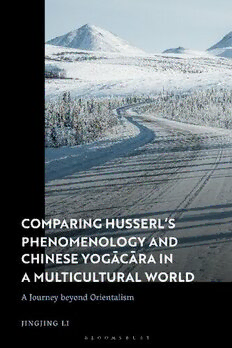
Comparing Husserl’s Phenomenology and Chinese Yogacara in a Multicultural World: A Journey Beyond Orientalism PDF
273 Pages·2022·7.529 MB·English
Most books are stored in the elastic cloud where traffic is expensive. For this reason, we have a limit on daily download.
Preview Comparing Husserl’s Phenomenology and Chinese Yogacara in a Multicultural World: A Journey Beyond Orientalism
Description:
While phenomenology and Yogacara Buddhism are both known for their investigations of consciousness, there exists a core tension between them: phenomenology affirms the existence of essence, whereas Yogacara Buddhism argues that everything is empty of essence (svabhava). How is constructive cultural exchange possible when traditions hold such contradictory views?Answering this question and positioning both philosophical traditions in their respective intellectual and linguistic contexts, JingjingLi argues that what Edmund Husserl means by essence differs from what Chinese Yogacarins mean by svabhava, partly because Husserl problematises the substantialist understanding of essence in European philosophy. Furthermore, she reveals that Chinese Yogacara has developed an account of self-transformation, ethics and social ontology that renders it much more than simply a Buddhist version of Husserlian phenomenology. Detailing the process of finding a middle ground between the two traditions, this book demonstrates how both can survive and thrive together in order to overcome Orientalism.The protagonists of this book project are Edmund Husserl (1859–1938) and Chinese Yogācārins represented by Xuanzang (玄奘c.602–664) and his disciples. Although they have provided similar articulations of the intentional structure of consciousness, there is a widely perceived incommensurability between them. Notably, Husserl defines phenomenology as the science of essence (Wesenwissenschaft), whereas these Chinese Yogācārins contend that everything is empty of essence (svabhāva). From this conflicting view on the nature of reality, there arises the problem of essence, which creates a challenge in cross-cultural communication. How then is a constructive cultural exchange possible when both cultures entail contradicting and conflicting views? To answer this question, this book recognizes and resolves the problem of essence, which allows for further discussions on the means to engage in comparative philosophy beyond Orientalism in a multicultural and multilingual world. Positioning both traditions in their respective intellectual and linguistic context, this book argues that what Husserl means by essence differs from what Chinese Yogācārins mean by svabhāva, partly because Husserl problematizes the absolutist understanding of essence in European philosophy, and partly also because Chinese Yogācārins evoke philosophical binaries in their critique of svabhāva which yields a correlative non-dualism parallel to Husserl’s transcendental idealism. Furthermore, Chinese Yogācārins have provided a detailed prescription on how to achieve universal awakening through the collaborative effort of all sentient beings, which makes Chinese Yogācāra more than a Buddhist version of Husserlian phenomenology. Although the problem of essence is not necessarily an obstacle, it is also not entirely irrelevant. Resolving this problem secures the premises for our comparative study and scrutinizes Orientalist viewpoints—notably that which posits that “the Western self has an essential core qua individuality whereas the Eastern self has no essence at all in a collectivist worldview.” Such a resolution shows how comparative philosophy furnishes people with access to a plurality of lived realities, which enable people from different cultures to locate a shared middle ground where they can thrive together, beyond Orientalism.
See more
The list of books you might like
Most books are stored in the elastic cloud where traffic is expensive. For this reason, we have a limit on daily download.
